人教新目标英语七下unit11《Howwasyourschooltrip》period5sectionb2a-2c导学案
新目标英语七年级下册讲义—Unit 11 How was your school trip

新目标七年级下册Unit 11 How was your school trip? 讲义一、重点单词k 挤奶2. cow .奶牛3. horse 马4. feed 喂养;饲养5. farmer 农民;农场主6. quite 相当;安全7. anything (常用于否定句或疑问句)任何东西;任何事物8. everything 一切;所有事物9. grow 种植;生长;发育10. farm 农场;务农;种田11. pick 采;摘12. excellent极好的;优秀的13. countryside 乡村;农村14. yesterday 昨天15. flower花16. worry 担心;担忧17. luckily 幸运地;好运地18. sun 太阳19. museum博物馆20. fire 火灾21. painting .油画;绘画22. exciting adj.使人兴奋的;令人激动的23. lovely可爱的24. expensive 昂贵的25. cheap 廉价的;便宜的26. slow缓慢的;迟缓的27. fast 快地(的)28. robot .机器人29. guide 导游;向导30. gift 礼物;赠品31. dark 黑暗的;昏暗的32. hear(heard)听到;听见自测表:二、短语归纳1.school trip 学校旅行2.go for a walk 去散步k a cow 给奶牛挤奶4.ride a horse 骑马5.feed chickens 喂鸡6.talk with 和......交谈7.take photos /a photo拍照st week上周9.ask some questions问一些问题10.quite a lot 相当多11.show sb. around sp.带某人参观某地12.learn about 了解13.grow strawberries种植草莓14.from...to... 从…到…15.pick some strawberries摘草莓16.take sth home带…回家17.climb the mountains 爬山18.visit my grandparents看望我的祖父母19.go fishing 去钓鱼20.so much 如此多的21.go to the zoo去动物园22.go to a farm去农场23a lot of fun很多乐趣24.play games 做游戏e out 出来26.go to the countryside去乡下27.science museum科学博物馆28.visit a museum 参观博物馆29.play chess with sb... 和…下棋30.buy sth for sb为某人买31.be interested in…对…感兴趣32.all in all总的来说33.not...at all 一点也不,根本不三、句型集萃1. How + be…? + like? ……怎么样?2. How do/does+主语+feel about...? 对......感觉如何?3. too many + 可数名词复数太多的……4.teach sb. how to do sth. 教某人怎样做某事5.quite + a / an + 形容词+可数名词单数= a + very + 形容词+可数名词单数一个相当/ 很……6.buy sth. for sb.=buy sb. Sth.为某人买东西7.It’s +形容词+to do sth. 做某事是......的8.sound+形容词听起来......四、词汇、句型讲解及拓展1.How was your school trip?学校旅行怎么样?【解析】How+be+主语?=What be+主语+like?意为“….怎么样?”★★★本句的答语:It was great./It was OK./It was/wasn’t good….【拓展】how是疑问副词,意为“怎么样,怎么”,用来构成特殊疑问句,主要用法如下:1)询问如何做某事,或者做某事方式。
人教新目标版七年级英语下册Unit11Howwasyourschooltrip优质教案
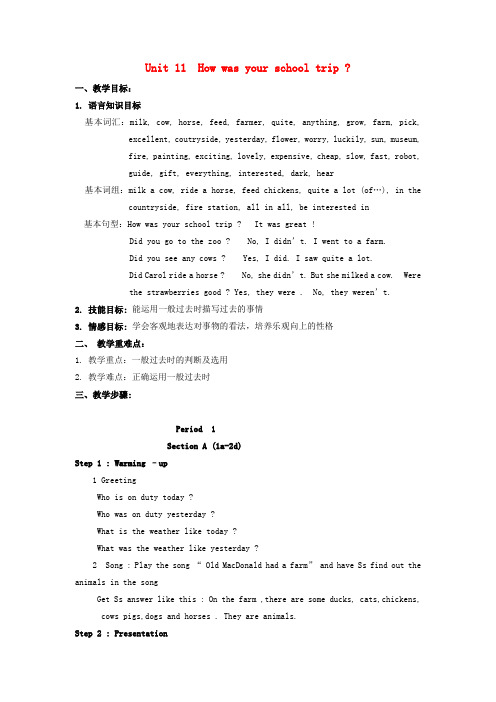
Unit 11 How was your school trip ?一、教学目标:1. 语言知识目标基本词汇:milk, cow, horse, feed, farmer, quite, anything, grow, farm, pick, excellent, coutryside, yesterday, flower, worry, luckily, sun, museum,fire, painting, exciting, lovely, expensive, cheap, slow, fast, robot,guide, gift, everything, interested, dark, hear基本词组:milk a cow, ride a horse, feed chickens, quite a lot (of…), in the countryside, fire station, all in all, be interested in基本句型:How was your school trip ? It was great !Did you go to the zoo ? No, I didn’t. I went to a farm.Did you see any cows ? Yes, I did. I saw quite a lot.Did Carol ride a horse ? No, she didn’t.But she milked a cow. Were the strawberries good ? Yes, they were . No, they weren’t.2. 技能目标: 能运用一般过去时描写过去的事情3. 情感目标:学会客观地表达对事物的看法,培养乐观向上的性格二、教学重难点:1. 教学重点:一般过去时的判断及选用2. 教学难点:正确运用一般过去时三、教学步骤:Period 1Section A (1a-2d)Step 1 : Warming –up1 GreetingWho is on duty today ?Who was on duty yesterday ?What is the weather like today ?What was the weather like yesterday ?2 Song : Play the song “ Old MacDonald had a farm” and have Ss find out the animals in the songGet Ss answer like this : On the farm ,there are some ducks, cats,chickens, cows pigs,dogs and horses . They are animals.Step 2 : Presentation1 Show a picture and tell Ss: This is also a farm. Last week Carol and his classmates had a school trip. They went to the farm. What did they do on the farm? How was their school trip?2 Show some pictures again and try to get the past tense verbs expressions according to the pictures.(1) Show the picture and the question(2) Ask one student to answer the question.(3) All students read it toghter.Q:Did he ride a horse?A:Yes, he did. He rode a horse.Q:Did he milk a cow?A:Yes, he did. He milked a cow.Q:Did he ride a horse?A :No, he didn’t .Did he feed chickens?Yes, he did. He fed chickens.Did you go to the zoo?No, I didn’t. I went to a farm.Did you see any cows ?Yes, I did. I saw quite a lot.Did they pick any strawberries on the farm ?Yes, they did .How were the strawberries?They were delicious.Were the strawberries good?Yes, they were.No, they weren’t.How was your school trip ?It was great.Were the strawberries good ?Yes ,they were.No, they weren’t.Step 3 ExercisesStep 4 : Practice (Listening and speaking)1a Match the phrses with the pictures.1b Listen and circle the three things Carol did on her school trip in 1a.1c Ask and an swer questions about Carol’s school trip.2a Listen and check the questions you hear.2b Listen again.Circle T for true or F for false2c Ask and answer questions about Carol’s visit to the farm.Step 5 :Tasks:1 Look at the pictures and practice the dialogueA:How was your school trip?B: It was …(boring/interesting/good/great…)A:What did you do on the school trip ?B:I went for a walk with my classmates.2 2d Role-play the conversation3.Groupwork: Make a survey. Ask your partners what they didlast week. Then give a reporter.Step 6 : Grammar Focus ( Get Ss read aloud )How was your school trip ? It was great !Did you go to the zoo ? No, I didn’t. I went to a farm.Did you see any cows ? Yes, I did. I saw quite a lot.Did Carol ride a horse ? No, she didn’t. But she milked a cow.Were the strawberries good ? Yes, they were . No, they weren’t.Step 6 Summary and Language pointsStep 7 Exercises :Period 2Section A (Grammar Focus-3b)Step 1:1 GreetingHow are you today ?How were you yesteday ?How was your last school trip ?2 Free talk :T : Do you want to know something about your classmates’ school trip ?Now Ask your partner :What did you do on your school trip ? Then fillin the following chart.Step 2 :Pre-task :1.Look at the pictures and fill in the blanks.2.Write the past forms of the following verbs.3. Check the past forms .Then ask Ss to summerize the rules of past forms ofthe regular verbs.Then explain the rules of past forms of the regular verbsStep 3 While-task 3a1 Ask Ss to read the letters in 3a .2 Ask Ss to complete Jim’s letter on the left and Bill’s reply on the right.3 Check the answers .Ask Ss to pay attention to the past tenst verbs.4 Explain the language points5 Read the letters together.Step 4: Post-task1. Challenge:Ask Ss to fill in the blanks according to the pictures.2 Check the answers. Ask Ss to read the answers one by one.3 Have a student read the letter out aloud.4 Ask Ss to read the letter several times. Try to recite it.5 Groupwork: Make up a story. Each student adds a sentence.If he or she can’tadd a sentenec .He or she must sing an English song.You can begin like this:Last week I visited my aunt’s house.____________________________________________________________________________________________________________________________Step 5 Language points and ExercisesPeriod 3Section B (1a-2c)Step 1:1 GreetingWhat did you do yesterday ?How were you yesterday ?2 Review: GamesUse your imagation and make up a story. Each student adds a sentence.If he or she can’t add a sentence,h e or she must sing an English song.Step 2 :Preparation 1a1 Match the activities with the pictures.2 Check the answersStep 2 :Listening 1b 1c1 Listen and answer the questions.1 How was Jane’s trip ?2 How was Tony’s trip ?2 Check the answers.3 Listen again. What did Jane and Tony do on their last school trip ? CheckTony or Jane.Step 3:Speaking 1d1 What was your last school trip like ?Discuss it with your partner with the following words.2 Teach Ss to read the following words :interesting difficult lovely slowexciting boring cool hotlucky large expensive terrible decilious great cheap fast3 Discuss like following conversation.A: I went to a farm on my last school trip.There are many animals on the farm.They are very lovely.B: That sounds great.A: How was your school trip ?B: It was __________A: How was the food there ?B: It was _____________A: How was the weather ?B: It was ___________Step 4: Prepatation2a Do the following words describe good things or bad things ? Put a √for good and an ×for bad . Leave a blank if they can mean both.Step 5 : Reading 2b,2c1 Read Helen’s and Jim’s diary entries and answer the questions in 2b2 Read the diaries again and complete the chart in 2cHow do Helen and Jim describe these things ?3 Check the answers .Ask Ss to pay attention to the past tenst verbs.4 Explain the language points5 Read the passages aloudStep 6 : Language points and exercises.Period 4Section B (3a-Self check )Step 1:1 GreetingHow are you feeling today?What did you do last night?How was your homework yesterday?2 Review : GamesUse your imagnation and make up a story. Each student adds a sentence.If he or she c an’t add a sentence,he or she must sing an English song. Step 2 : Preparation1.3a Look at the pictures of Bob’s school plete his diary entry.2. 3b Linda is Bob’s classmate. Complete her diary entry.Step 2 : Writing3c Now write a diary entry for your own school trip.Explain if you liked it or didn’t like it and why.Step 3 : Self-check1 Write more verbs and their past forms in each group.2 Complete the conversations with the correct forms of the verbs in the box.3 Check the answers4 Grammar: The Simple Past Tense。
人教新目标版英语七下Unit 11《How was your school trip》(Sectio

人教新目标版英语七下Unit 11《How was your school trip》(Section A 1a—1c)教学设计一. 教材分析人教新目标版英语七下Unit 11《How was your school trip》主要让学生通过学习和交流,掌握过去进行时态的用法,以及如何描述过去发生的事情。
本节课的主要内容是关于学生在学校旅行中的见闻和感受,通过听、说、读、写的方式,提高学生的语言运用能力。
二. 学情分析学生在学习本节课之前,已经掌握了基本的英语语法知识,具备一定的听、说、读、写能力。
但对于过去进行时态的运用,可能还存在一定的困难。
因此,在教学过程中,需要注重引导学生理解和运用过去进行时态。
三. 教学目标1.学生能够掌握过去进行时态的构成和用法。
2.学生能够通过听、说、读、写的方式,描述自己在学校旅行中的见闻和感受。
3.学生能够在真实情境中,运用过去进行时态进行交流。
四. 教学重难点1.过去进行时态的构成和用法。
2.如何引导学生运用过去进行时态描述过去发生的事情。
五. 教学方法1.情境教学法:通过设置真实的情境,让学生在实践中学习和运用过去进行时态。
2.任务型教学法:通过完成各种任务,引导学生积极参与课堂活动,提高语言运用能力。
3.互动式教学法:教师与学生、学生与学生之间的互动,激发学生的学习兴趣,提高课堂氛围。
六. 教学准备1.教学PPT:包含本节课的主要内容、图片、视频等。
2.教材:人教新目标版英语七下Unit 11。
3.录音机:用于播放听力材料。
4.教学卡片:用于操练和巩固所学内容。
七. 教学过程1.导入(5分钟)利用图片或视频展示学校旅行的场景,引导学生回忆学校旅行中的趣事,激发学生的学习兴趣。
2.呈现(10分钟)教师通过PPT呈现本节课的主要内容,包括单词、短语和句子。
同时,讲解过去进行时态的构成和用法,让学生初步感知和理解。
3.操练(15分钟)学生分组进行角色扮演,模拟学校旅行中的场景,用过去进行时态进行交流。
新目标七年级下册英语Unit11_How_was_your_school_trip教案

Unit11 How was your school trip ?Period 1 (Section A:1a, 1b, 1c)Step I Lead-inRevise past forms of some verbs. Enable students to use them to make a list of their last school trip activities.T: Do you still remember your last school trip? When was it? Where did you go?Ss: ...T: What did you do on the trip? Now make a list of the things you did on the trip. Remember, use the simple past tense of verbs because we are talking about the past event. Is that clear?Help students to review the simple past of some verbs they have learned before. Show the following chart. Let students write down the simple past of the verbs. Ask a student to write the answers on the board. Then check the answer with the whole class.Then let them make their own lists. Ask some students to share their lists with the class and make sure they use the correct simple past tense of the verbs.The following chart shows the simple past of some irregular verbs. Students may find some useful while they are making the list.verb simple past verb simple past buy bought teach taughtthink thought catch caughtbring broughtride rode write wrotegrow grew throw threwdrink drank sing sangStep II Listening and Oral practice (Section A 1b)Play the recording. Students only listen and get a general idea of the conversation.Play the tape a second time. Students listen and circle the activities.Play the tape a third time, students listen and read after the tape.Correct their pronunciation and intonation mistakes.Step III Pairwork (Section A 1c)Point to the speech bubble in the picture of activity 1b. Let students practice the conversation between Bob and Carol in pairs.Call attention to the questions:Did you ...?What did you ...?And their answers:Yes, I did. No, I didn’t.I milked a cow.Step IV Summary and HomeworkT: This class we have learnt how to talk about school trips with “Did you...” We also learned the simple past form of some verbs. After class, please review the chart about the verbs. Don’t forget to preview the next part of Section A (2a, 2b, 2c,2d, Grammar focus).Period 2 (Section A:2a, 2b, 2c,2d)Step I Revision and Lead-inGreet the class as usual. Get students review what they have learned in the last period by asking some questions about their last summer vacation.T: Where did you go on your last summer vacation, Xiao Bin?S: I went to Qingdao with my parents.T: Wow, a cool place. What did you do there?S: We climbed Laoshan Mountain, swam in the sea and ate sea food.T: Did you visit an aquarium?S: Yes, we did. We took photos with dolphins and seals.T: Did you have a good time there?S: Yeah. We went to the beach and ate lots of seafood. I want to go there next vacation again.Step II Listening (Section A 2a, 2b)Ask a few questions about Carol’s school trip.T: Where did Tina go?S: She went to the farm.T: What did she do there?S: She hung out with her friends and took lots of photos.T: What else did she do there? Now let’s listen. First, open your books at page 62. Read the questions in activity 2a please.Point to the list of questions and have one student read the questions to the class. Explain some new words and stress the verb phrases.Play the tape. Students listen and check the questions they hear.T: Look at activity 2b. Read the sentences and get the meaning of each sentence. Then listen to the recording again and circle “T” or “F”.Play the recording again, students listen and circle the answers.Then play the recording again, pause where the right answers are. Check the answers with the whole class.Step III Pairwork (Section A 2c,)In this step, students will practice talking about Carol’s school trip according to the information in activity 2a,2b. This will help them to practice the use of “Did she ...”question and the affirmative and negative statements.Have students complete the task in pairs.Step IV Role-play(2d)Do2d:Ask students to role-play the conversation in pairs,then explain the conversation.Step V Homework1. Listen to the whole conversation between Tina and Kevin. Retell what Tina did on her school trip in your own words.2. Make a list of verb phrases you have learned so far in this unit and try to remember them.Period 3 (Section A:Grammar focus,3a, 3b)Step I Revision and Lead-inGreet the class as usual and check the homework.Ask several students to retell what Eric did on his trip.Step II GrammarRevise the grammar box.Let students do some drill practice with the grammar items.Drill:—Did you (A) go to the zoo (B)?Replace A with: he, she, they, Mary, Liu Li, Wang Fei, etc.Replace B with: take photos, hang out with friends, see some dolphins, go to the movies, buy a souvenir, have some ice cream—Yes, I (A) did.—No, I (A) didn’t. I (A) went to the aquarium (B).Replace A with: he, she, they and we.Replace B with: took photos, hung out with friends, etc.Step II Reading (Section A 3a)T: Read the letters and find answers to the following questions.1. Did Jim have a good time on the school trip?2. Where did Jim go for the day?3. What did Jim do after lunch?After they have finished, check the answers.Then ask the students to retell the letters with their own words.Now listen to the tape and repeat after it. Pay attention to your pronunciation and intonation.Step III PairworkAsk students to write down a list of places they visited (as column A), andthings they did there (as column B).Column A Column BTianlong Mountain ride horseBeidaihe go swimmingHongkong go shopping... ...Ask a pair of students to read the sample conversation. Explain that:T: “That sounds interesting”is B’s opinion on the things A did. We can also say: That sounds cool/fun/boring/exiting etc. Now work in pairs and make your own conversations. Give opinions on the things your partner did.Sample conversation:A: Where were you last Sunday?B: My family went to Tianlong Mountain.A: That sounds exciting. Did you climb the mountain?B: Yes, we did. We also had a picnic.Ask some pairs to act their conversations out for the class.Step IV Groupwork (Section A 3b)Get students sit in a circle and make up a story.T: Let’s play a game. Students in Group one, three, five, seven sit in the front. Students in Group two, four, six, eight sit in the back. Sit in a circle quickly. We are going to make up a story. Choose a member in your group to start the story. Then each of you add a sentence to keep the story going. Remember, the story happened in the past, so you should use the simple past tense. Let’s see which group’s story is more interesting.Step V Homework1. Write a short story about your school trip.2. Prepare for Section B.Period 4 (Section B:1a, 1b, 1c,1d,2a, 2b, 2c)Step I Revision and Lead-inGreet the class as usual and check the homework.Ask two students to read their school trip experiences.Step II Matching and listening (Section B 1a, 1b,1c,1d)Call attention to the pictures in activity 1a. Help students understand the meanings of the 6 phrases.T: Which of these activities did you do on your last day off? Rank them 1-6. Then ask students to listen to a conversation between Jane and Tony in activity 1b and 1c. Then check the answers.Get them work in pairs and discuss their last trip in 1d. Ask some pairs of students to say their conversations to the class.Step III Reading (Section B 2a, 2b,2c)T: Well, most of us have a busy weekend. We always do a lot of things during the weekends. Do you often feel tired after hard work? What do you most want to do?S: Sleep the whole day.S: Have delicious food.S: Play computer games.S: Listen to light music.T: How were Helen’s and Jim’s school trips? Did they do the same things as you do? Look at the chart in activity 2a to complete it.Look at activity 2b. Read 2b to answer the questions.Check the answers with the whole class.Then let them pick out other expressions in the conversation that show opinions or feelings.Ask students to complete the chart in 2c,then check the answer.Step IV PairworkT: From 2b, we know Helen’trip was interesting and exciting and Tony’trip was terrible . What was your last day off like? Was it a good day off or a terrible day off? Now work in pairs and talk about your last day off.Let students present their conversations in front of the class using the target language.HaStep V HomeworkWrite a short passage about what your father or mother did on his/her last day off.Period 5 Period 5 (Section B:3a, 3b, 3c, Self check)Step I Revision and Lead-inGreet the class as usual and check the homework.T: Do you remember Helen and Jim did on their school trip? Who can retell the story to us? Ladies, first!Show the pictures on the screen again. These will help the students to remember the main events.Step II Reading and writing (Section B 3a)Turn to page 66, activity 3a. Read the diary. Make a list of the things Bob did that day.Have students complete Bob’s diary,then get some students read it to the class. Then play the tape and let students read after it. Check their pronunciation and intonation.Step III Writing practice (Section B 3b, 3c)Read this diary and fill in the blanks.Then let students read the diary to their partners and check the answers with each other. .Then deal with activity 3c.T: Now write a diary and tell us what you did on your last school trip. First make a list of ideas before you begin to write the diary. In your diary you must include Activities, Places, Description words. Make a list of at least three things under each heading. You’d better write at least six or seven sentences.After they have finished, ask some students to read their diaries to the class. Step IV Self CheckDo Self Check1:Write more verbs and their past forms and remember them.Do Self Check2:Complete the conversations with the correct forms of the verbs in the box.Ask some pairs to act them out in class.Step V Homework1. Make a list of the verb phrases you have learned in this period and remember them.2. Finish the exercises in Self check.。
人教新目标版英语七下Unit 11《How was your school trip》(Sectio

人教新目标版英语七下Unit 11《How was your school trip》(Section B 2a)教学设计一. 教材分析人教新目标版英语七下Unit 11《How was your school trip》主要让学生通过学习关于学校旅行的相关话题,掌握一般过去时的疑问句和回答,以及如何描述过去的事情。
Section B 2a是一篇关于两个学生讨论他们学校旅行的对话,通过这篇对话,学生可以进一步理解一般过去时的运用,并能够运用所学知识进行实际对话。
二. 学情分析学生在学习本节课之前,已经掌握了一般现在时和一般过去时的基本结构,同时具备了一定的听说读写能力。
但对于如何运用一般过去时进行疑问句的提问和回答仍需加强练习。
此外,学生对于描述过去发生的事情还缺乏一定的词汇和表达方式,因此,在教学过程中,需要引导学生运用正确的词汇和句型进行描述。
三. 教学目标1.能听懂、会说、会读、会写关于学校旅行的相关词汇和句型。
2.能运用一般过去时进行疑问句的提问和回答。
3.能够描述过去发生的事情,并能够运用所学知识进行实际对话。
四. 教学重难点1.重点:掌握关于学校旅行的相关词汇和句型,运用一般过去时进行疑问句的提问和回答。
2.难点:如何引导学生运用正确的词汇和句型描述过去发生的事情。
五. 教学方法1.任务型教学法:通过设置各种任务,让学生在实际操作中运用所学知识。
2.情境教学法:创设各种情境,让学生在真实的环境中进行语言交流。
3.交际式教学法:引导学生进行小组讨论和对话,提高学生的口语表达能力。
六. 教学准备1.教学课件:制作与学校旅行相关的课件,包括图片、视频等。
2.教学道具:准备一些与学校旅行相关的实物道具,如地图、照片等。
3.练习册:准备与本节课相关的一般过去时的练习题。
七. 教学过程1.导入(5分钟)利用图片或视频引入学校旅行的主题,激发学生的兴趣,引导学生谈论他们曾经的学校旅行经历。
2.呈现(10分钟)展示2a的对话,让学生听懂对话内容,然后老师讲解对话中的重点词汇和句型。
人教七下Unit 11 How was your school trip?知识点

Unit 11 How was your school trip?Section A1. How was your trip yesterday?(1)本句为询问某事情况的常用句型,其中was是be动词的过去式,如果询问当前的情况则be动词用is。
其答语常用:It was great! (好极了) / It was OK.(还可以)/ It wasn’t good.(不好。
)/ All right.(很好。
)/ It was not bad.(还不错。
)等。
How + be+…?相当于What + be +… + like? 例如:-How was her holiday?-It was not bad.(2)How是疑问副词,意为“如何,怎样”,常用来引导特殊疑问句来询问方式、程度、状况等。
常用于以下交际用语中:1)How is/are +sb. ? 用来询问人的身体、工作、学习或生活等的状况。
例如:-How are you? -Fine, thank you.2)How is/are +sth.?用来询问某物或者某事的状况如何。
例如:How is your work?3)How do you do? 并不表示疑问,是第一次见面时的问候语,回答仍用此句。
例如:How do you do? ---How do you do?4)How is it going?/ How is everything going? 用来询问事情进展如何。
例如:How is it going? Very well./ Not too bad./just so so.2. feed chickenfeed 作及物动词,意为“喂养,饲养”,其后常接表示动物名称的词作宾语。
例如:My father’s job is to feed the animals.拓展:(1)feed..to…意为“把……喂给……吃”。
feed后接饲料或者食物名称做宾语,to为介词,其后一般接动物或者小孩等名词表示对象。
人教新目标版英语七下Unit 11《How was your school trip》(Sectio

人教新目标版英语七下Unit 11《How was your school trip》(Section B 2b)教学设计一. 教材分析人教新目标版英语七下Unit 11《How was your school trip》(Section B 2b)主要讲述了四个同学分享他们学校旅行的经历。
本节课的主要语言点是过去式的疑问句和回答,以及一些表示旅行经历的词汇和短语。
通过本节课的学习,学生能够听懂、会说、会读、会写与旅行经历相关的句子,并能够运用所学知识进行简单的交流。
二. 学情分析七年级的学生已经掌握了一定的英语基础知识,能够听懂、会说、会读、会写一些简单的英语句子。
但是,对于过去式的疑问句和回答的运用还有一定的困难,需要通过大量的练习来巩固。
此外,学生对于一些表示旅行经历的词汇和短语还不够熟悉,需要在教学中进行引入和讲解。
三. 教学目标1.学生能够听懂、会说、会读、会写与旅行经历相关的句子。
2.学生能够运用过去式的疑问句和回答进行简单的交流。
3.学生能够掌握表示旅行经历的词汇和短语。
四. 教学重难点1.过去式的疑问句和回答的运用。
2.表示旅行经历的词汇和短语的掌握。
五. 教学方法1.任务型教学法:通过设定具体的情境,让学生在完成任务的过程中运用所学知识。
2.交际法:通过师生之间的互动,生生之间的交流,让学生在实际的语言环境中学习英语。
3.情境教学法:通过图片、视频等媒体手段,为学生创设真实、生动的情境,提高学生的学习兴趣。
六. 教学准备1.教学课件:制作与本节课内容相关的课件,包括图片、视频等媒体素材。
2.学案:为学生准备学习任务单,包括旅行经历的相关问题。
3.黑板:准备黑板,以便在课堂上进行板书。
七. 教学过程1.导入(5分钟)利用图片或视频展示不同类型的旅行,引导学生谈论自己的旅行经历,激发学生的学习兴趣。
2.呈现(10分钟)展示本节课的主要内容,让学生听懂四个同学分享旅行经历的故事。
在呈现过程中,引导学生关注过去式的疑问句和回答,以及表示旅行经历的词汇和短语。
人教新目标英语七年级下Unit 11 How was your school tripSection

Unit 11 How was your school trip?Section B(2a-self check)导学案(第四课时)【学习目标】1. 复习并学习形容词,能区分褒义词和贬义词,能够通过阅读短文使学生学会如何使形容词进行评论,怎样发表自己感想。
并学会使用一般过去时态写日记。
2. 单词和短语:exciting, lovely, expensive, cheap, slow, fast, robot, guide, gift, everything,interested, dark, hear【学习过程】一、课前预习翻译下列短语或语块:1. go on a school trip___________________2. get there _____________________3. 慢的←→快的______________4. 昂贵的←→便宜的_____________5. 下棋____________________6. 坐火车_____________________7. model robot _______________ 8. 对…感兴趣_________________9. 总的说来__________________ 10. not…at all ___________________11. see sth.along the way________________ 12. teach sb. how to do sth. ____________13. teach sb. how to do sth _______________ 14. on the slow trian________________二、课上活动阅读理解1. 2a下列单词描述好事情还是坏事情?好事情打√,坏事情打×。
如果两种意思都有,留着空。
interesting ___ difficult ___ lovely___ slow___ exciting___boring___ cool ___ hot ___ lucky ___ large___ expensive __terrible ___ delicious ___ great ___ cheap ___ fast___2. 速读。
新人教版七年级英语下册Unit 11 How was your school trip Sectio

1b. Listen and answer the questions.
4.How to ……疑问句+不定式? They want to know how to make a model plane? 他们想知道如何制作飞机模型?(报纸) 5.take photos=take pictures照相 take a photo /photos of sb 给某人拍照 6.buy——过去式:bought 买 buy sb sth =buy sth for sb 给某人买某物 buy some lovely gift for my parents。 点睛:p74 7. lovely 形容词:可爱的 报纸:Helen has a lovely dog and she likes it very much。 Helen 有一个可爱的狗狗,她非常喜欢它。
2.It is +adj+to do sth 做某事很怎么样。 3.any 用于否定句,此句有didn’t)
(7)There were also too many people and I couldn’t really see or hear the guide. (人也太多而且我也不能看见或听见向导说的 话。)
expensive
3a. Look at the pictures of Bob’s school trip. Complete his diary entry.
2020年人教版新目标七下Unit 11 How was your school trip 单词和课
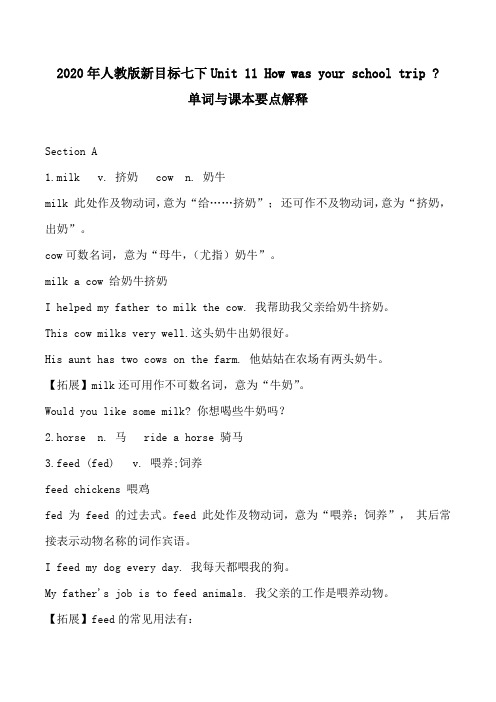
2020年人教版新目标七下Unit 11 How was your school trip ?单词与课本要点解释Section Ak v. 挤奶 cow n. 奶牛milk 此处作及物动词,意为“给……挤奶”;还可作不及物动词,意为“挤奶,出奶”。
cow可数名词,意为“母牛,(尤指)奶牛”。
milk a cow 给奶牛挤奶I helped my father to milk the cow. 我帮助我父亲给奶牛挤奶。
This cow milks very well.这头奶牛出奶很好。
His aunt has two cows on the farm. 他姑姑在农场有两头奶牛。
【拓展】milk还可用作不可数名词,意为“牛奶”。
Would you like some milk? 你想喝些牛奶吗?2.horse n. 马 ride a horse 骑马3.feed (fed) v. 喂养;饲养feed chickens 喂鸡fed 为 feed 的过去式。
feed 此处作及物动词,意为“喂养;饲养”,其后常接表示动物名称的词作宾语。
I feed my dog every day. 我每天都喂我的狗。
My father's job is to feed animals. 我父亲的工作是喂养动物。
【拓展】feed的常见用法有:①feed sth.to sb. /sth. 把某物喂给某人/某物Please feed some grass to the cow. 请给这头奶牛喂些草。
She fed milk to the baby. 她给婴儿喂了牛奶。
②feed on 以……为生,以……为食Sheep feed on grass. 绵羊以草为食。
③feed…on/with…用……喂……He feeds the dog on meat. 他用肉喂狗。
4.farmer n. 农民;农场主farm名词,意为“农场”;动词意为“耕种;干农活”。
人教新目标版英语七下Unit 11《How was your school trip》(Sectio
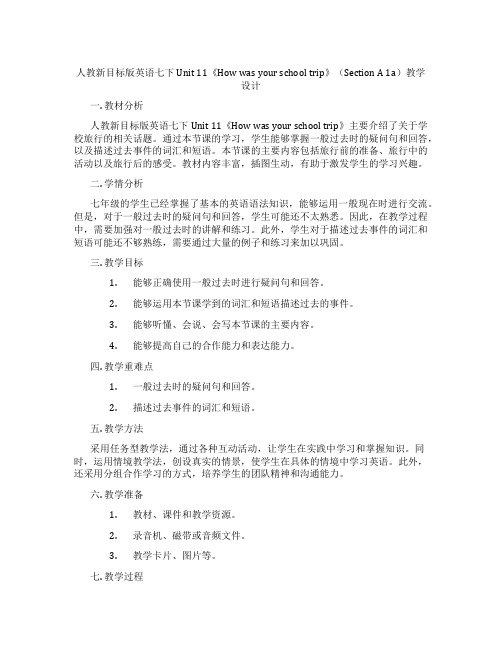
人教新目标版英语七下Unit 11《How was your school trip》(Section A 1a)教学设计一. 教材分析人教新目标版英语七下Unit 11《How was your school trip》主要介绍了关于学校旅行的相关话题。
通过本节课的学习,学生能够掌握一般过去时的疑问句和回答,以及描述过去事件的词汇和短语。
本节课的主要内容包括旅行前的准备、旅行中的活动以及旅行后的感受。
教材内容丰富,插图生动,有助于激发学生的学习兴趣。
二. 学情分析七年级的学生已经掌握了基本的英语语法知识,能够运用一般现在时进行交流。
但是,对于一般过去时的疑问句和回答,学生可能还不太熟悉。
因此,在教学过程中,需要加强对一般过去时的讲解和练习。
此外,学生对于描述过去事件的词汇和短语可能还不够熟练,需要通过大量的例子和练习来加以巩固。
三. 教学目标1.能够正确使用一般过去时进行疑问句和回答。
2.能够运用本节课学到的词汇和短语描述过去的事件。
3.能够听懂、会说、会写本节课的主要内容。
4.能够提高自己的合作能力和表达能力。
四. 教学重难点1.一般过去时的疑问句和回答。
2.描述过去事件的词汇和短语。
五. 教学方法采用任务型教学法,通过各种互动活动,让学生在实践中学习和掌握知识。
同时,运用情境教学法,创设真实的情景,使学生在具体的情境中学习英语。
此外,还采用分组合作学习的方式,培养学生的团队精神和沟通能力。
六. 教学准备1.教材、课件和教学资源。
2.录音机、磁带或音频文件。
3.教学卡片、图片等。
七. 教学过程1.导入(5分钟)通过展示一张美丽的旅行图片,引导学生谈论自己最喜欢的旅行。
同时,询问学生是否曾经去过某个地方,引导学生思考一般过去时的用法。
2.呈现(10分钟)展示本节课的主要内容,包括旅行前的准备、旅行中的活动以及旅行后的感受。
通过图片、卡片等形式,呈现本节课的重点词汇和短语。
3.操练(15分钟)采用分组合作的方式,让学生进行角色扮演,模拟旅行中的各种情景。
人教新目标版英语七下Unit 11《How was your school trip》(Sectio

人教新目标版英语七下Unit 11《How was your school trip》(Section B 2a)教案一. 教材分析《人教新目标版英语》七下Unit 11主要讨论关于学校旅行的经历。
Section B 2a是一个阅读材料,描述了两个学生对于他们学校旅行的不同看法。
通过阅读这个材料,学生可以了解和练习一般过去时的被动语态。
本节课的目标是通过阅读和讨论,提高学生的阅读理解能力和语言运用能力。
二. 学情分析七年级的学生已经掌握了基本的英语语法和词汇,对于一般过去时和被动语态有一定的了解。
他们在学习过程中,需要通过大量的练习来提高语言运用能力。
同时,他们对于学校旅行这样的主题比较感兴趣,可以通过讨论和分享,激发他们的学习兴趣。
三. 教学目标1.能够理解并朗读课文2a。
2.能够通过阅读和讨论,掌握一般过去时的被动语态。
3.能够运用所学知识,描述自己的一次学校旅行经历。
四. 教学重难点1.重点:通过阅读理解,掌握一般过去时的被动语态。
2.难点:如何运用一般过去时的被动语态,描述自己的学校旅行经历。
五. 教学方法采用任务型教学法,通过阅读、讨论、分享和实践,激发学生的学习兴趣,提高他们的语言运用能力。
六. 教学准备1.课文2a的复印件或幻灯片。
2.与学校旅行相关的图片或视频。
3.一份学校旅行的计划或经历。
七. 教学过程1.导入(5分钟)通过提问,引导学生回忆自己的一次学校旅行经历。
例如:“你们有没有去过什么有趣的地方?”、“你最喜欢学校旅行的哪个部分?”等。
2.呈现(5分钟)向学生展示课文2a,并让学生独立阅读。
在阅读过程中,引导学生关注一般过去时的被动语态。
3.操练(10分钟)让学生两人一组,互相练习使用一般过去时的被动语态,描述自己的学校旅行经历。
教师可以提供一些关键词或句子结构,帮助学生进行练习。
4.巩固(5分钟)通过小组讨论,让学生分享彼此的学校旅行经历。
鼓励他们使用一般过去时的被动语态进行描述。
初中英语人教版七年级下册《Unit 11 How was your school trip Sect

They weclohreveea_l_py_.___ and
terrJibimle's&idbeoaring
The train was _s_lo__w___. He's not _in_t_e__re__sted in robots.
New words
dark
dark作形容词,意为“黑暗的”,反义词为 bright,意为“光明的” 天快黑了。 It' s getting dark. [拓展]①dark作形容词,还可意为“(色彩)深 的”;反义词为 light,意为“(色彩)浅的” 我爱好深蓝色。 I like dark blue. ②dark作名词,意为“黑暗;暗处” 她在黑暗中什么也看不见。 She could see nothing in the dark.
Warm-up
S1. WhMS2. WhEenacdhidstyuoduegnot tahdedres?a sentence.
S3. How was the weather there?
S4. WhSohdaidreyyoouugroswtoitrhy.?
New words
fast
fast作副词,意为“快地” 反义词为slowly“慢地 这个男孩跑得快。 The boy runs fast. fast用作形容词,意为“快的” 反义词为slow“慢的 我们可以乘快车。 We can take a fast train.
New words
guide
guide可数名词,意为“导游;向导” 导游带我们参观了博物馆。 The guide showed us around the museum. [拓展] guide及物动词,意为“带领;引导” 她领着她的学生过马路。 She guided her students across the road.
七年级英语下册Unit11Howwasyourschooltrip说课稿1新版人教新目标版
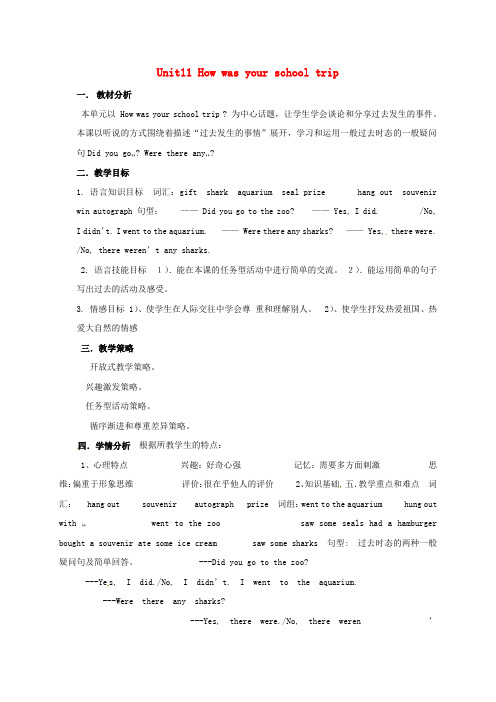
Unit11 How was your school trip一.教材分析本单元以 How was your school trip ? 为中心话题,让学生学会谈论和分享过去发生的事件。
本课以听说的方式围绕着描述“过去发生的事情”展开,学习和运用一般过去时态的一般疑问句Did you go…? Were there any…?二.教学目标1. 语言知识目标词汇:gift shark aquarium seal prize hang out souvenirwin autograph 句型:—— Did you go to the zoo? —— Yes, I did. /No,I didn’t. I went to the aquarium. —— Were there any sharks? —— Yes, there were./No, there weren’t any sharks.2. 语言技能目标1).能在本课的任务型活动中进行简单的交流。
2).能运用简单的句子写出过去的活动及感受。
3. 情感目标 1)、使学生在人际交往中学会尊重和理解别人。
2)、使学生抒发热爱祖国、热爱大自然的情感三.教学策略开放式教学策略。
兴趣激发策略。
任务型活动策略。
循序渐进和尊重差异策略。
四.学情分析根据所教学生的特点:1、心理特点兴趣:好奇心强记忆:需要多方面刺激思维:偏重于形象思维评价:很在乎他人的评价 2、知识基础五.教学重点和难点词汇: hang out souvenir autograph prize 词组:went to the aquarium hung outwith … went to the zoo saw some seals had a hamburger bought a souvenir ate some ice cream saw some sharks 句型: 过去时态的两种一般疑问句及简单回答。
人教七年级英语下《Unit11HowwasyourschooltripPeriod4》
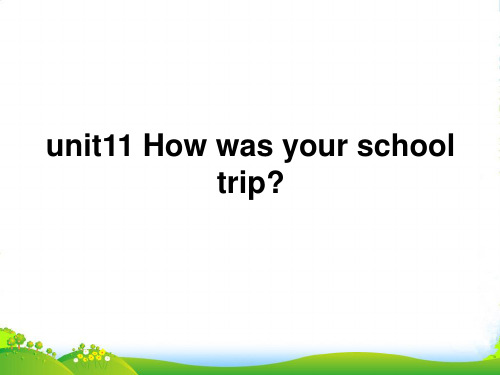
5. My father often
(swim)in this river when he was
young.
答案: 1. was 2. Were 3. visited 4. rode 5. swam
Ⅱ. 句型转换
1. She was a dancer 10 years ago. (改为否定句)
She
的消息时, 每个人激动不已。excited人感到兴奋, 修饰人;
exciting令人兴奋的, 指物体令人兴奋, 修饰物, 故选B。
【习作在线】 四练笔巩固--1师友练笔
请根据下表提示, 以“A Great School Trip”为题写一篇
英语短文, 介绍七年级一班去泰山(Mount Tai)校游的情况。
3. 昨天他参加了学校旅游。
He
a school trip yesterday.
4. 母亲教我如何做早饭。
My mother
me
cook breakfast.
5. 他一点也不喜欢这次旅行。
He
like the trip
.
答案: 3. went on 4. taught; how to 5. didn’t; at all
19. along the way 沿线
20. after that 之后 21. buy sth. for sb. 为某人买某物
22. all in all 总的来说 23. take a / the train 乘火车
一、知识回顾 ---2. 教师点评
【语法总结】一般过去时 (一)一般过去时的定义 一般过去时表示过去某个时间发生的动作或存在
→
(adv. )幸运地; 好运地
7. paint(v. )
Unit11Howwasyourschooltrip.教学设计-人教版英语七年级下册
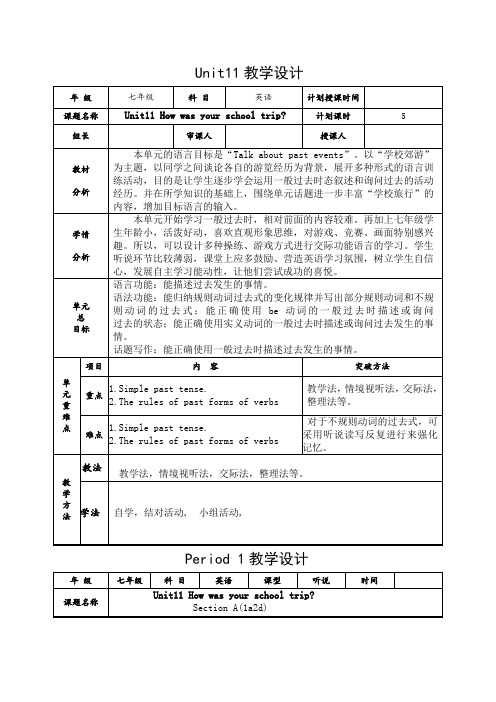
___Yes, I did. / No, I didn’t.
目标检测设计(当堂)
共 案
个 案
绩优学案P98页适当形式填空,完成句子
作业设计(课后)
共 案
个 案
绩优学案A:根据2d编写对话并翻译
B:抄写2d对话并翻译
C:抄写1a短语三遍并翻译
教学反思
Period 2教学设计
Step2:
presentation
Let students look at the pictures of 1a
1. What did the girl do on her last school trip?
2.How was her last school trip?
The teacher writes the phrases on the blackboard and mark out the past forms
依据新课标三级听说要求。
重难点
内 容突破方法重点来自1. Talk about the activities in the farm.
2. Learn simple past tense.
3. Learn to talk about the past events:
看图片回答问题、结对练习、小组活动、拓展练习。
突破方法
重点
1.Simple past tense.
2.The rules of past forms of verbs
教学法,情境视听法,交际法,整理法等。
难点
1.Simple past tense.
2.The rules of past forms of verbs
人教新目标七年级英语下册Unit-11-How-was-your-school-trip?全单元课件

— Did they go shopping? — No, they didn’t. — Did they visit the museum? — Yes, they did.
What did you do on your last school trip? Did you go to the zoo? Did you go to the aquarium? Were there any…? What else did you do? …
milk
cow
horse
feed
farmer
go for a walk
milk the cow
ride a horse
feed chickens
talk with a farmer
take some photos
1a
1. went for a walk e 2. milked a cow b 3. rode a horse a 4. fed chickens c 5. talked with a farmer f 6. took some photos d
Unit 11
How was your school trip?
Period 1
Section A 1a~1c
Brainstorming
Weekend activities: What do you usually do on weekends?
What do/does he / she / they often do?
Language Goal :
Talk about past events
Do you know what animals there
are on the farm?
人教新目标版英语七下Unit 11《How was your school trip》(Period

---
写前指导
My name’s Cindy. I had a pleasant day last month. In the morning, I got up late and then began to do my homework. It took me about two hours to finish it. Then I went shopping with my mother. Next, I had fun playing computer games. At 15:00, I went to the Old People’s Home by bus and helped them clean the house and wash their clothes. After that, I talked with them happily and gave them some lovely gifts I bought this morning. Before I went to bed, I listened to music. It made me relaxed. What a happy day I had!
---
思路点拨
三.找出文章中的连接词。 12. 和;而且_____a_n_d_______________ 13. 然后_______t_h_e_n_________________ 14. 接着,下一个____n_e_x_t____________ 15. 在那之后 _______a_ft_e_r_t_h_a_t________
在我睡觉之前,我先听音乐。 翻译:在她拉小提琴之前,她先洗衣服。
- 1、下载文档前请自行甄别文档内容的完整性,平台不提供额外的编辑、内容补充、找答案等附加服务。
- 2、"仅部分预览"的文档,不可在线预览部分如存在完整性等问题,可反馈申请退款(可完整预览的文档不适用该条件!)。
- 3、如文档侵犯您的权益,请联系客服反馈,我们会尽快为您处理(人工客服工作时间:9:00-18:30)。
Unit 11 How was your school trip Period 5 Section B 2a-2c 教师寄语:Travel is the road to knowledge. 旅行是知识之路。
【学习目标】【学习重点】:
根据文章找寻关键信息,提高阅读能力。
【体验学习】:
I、预习交流
1. 根据图片和文章标题等,预测新课内容;
2. 根据音标拼读单词并牢记;
3. 自学课文,勾画出重点和疑惑。
II、翻译官
1. exciting___________________
2. 可爱的 _____________________
3. 慢的←→快的______________
4. 昂贵的←→便宜的_____________
5. 下棋 ____________________
6. 坐火车 _____________________
7. model robot _______________ 8. 对…感兴趣 _________________
9.总的说来__________________ 10. not…at all ___________________
【课堂导学】:
I、新课呈现
Step1 Review & Lead-in
Brainstorming: T: We often use adjectives to describe things. Some describe good things and some describe bad things. Can you think of some adjectives?
Finish2a. Put a √ for good and an × f or bad.
Step2 Presentation
1. Read the diary entries about the school trip and answer the two questions.
2. Read again and complete the chart in 2b.
3. Group work: read the ad again, try to find the key points.
Then say them out one by one. eg:
<1> by train = take the train
<2> after that <3> ….
Step3 Consolidation
Read the key points and the article together.
II、合作交流
Group work: 分析总结阅读技巧,并尝试根据2c中的表格复述文章。
Notes:_____________________________________________________
_____________________________________________________
【自主检测】:完形填空 June, 15th
Today we had _ __1 _ exciting trip. My father, my mother and I _ __2 _ to summer camp. We went to the mountains. First, we ___ 3_ to the foot(脚) of the mountain___ 4__ bus. In the middle of the mountain, there was a river. The water was clean.
I washed my face with the ___ 5 _. I t was warm. There __ _6 __ some fishes in the river. And there were a lot of __ _7 __ flowers in the mountain. At 12 o’clock,
many people got together, and they were very _ __8_ _ . We made our lunch in the mountain. The food was very ___ 9___ , and we liked it very much. After lunch, we
went on our trip. At last, we got to the t op(顶部) of the mountain. We were very
___10 ___. All in all, we enjoyed the trip very much.
( ) 1. A. a B. an C. the
( ) 2. A. go B. goes C. went
( ) 3. A. get B. got C. gets
( ) 4. A. by B. take C. in
( ) 5. A. water B. food C. trip
( ) 6. A. is B. were C. was
( ) 7. A. ugly B. difficult C. beautiful
( ) 8. A. friendly B. boring C. expensive
( ) 9. A. terrible B. delicious C. exciting
( ) 10. A. happy B. unhappy C. lovely
【快乐链接】: Diary
人们常说:要真正学好英语,就要培养用英语思想的能力。
但是,要做到这一点是不容易的。
有一个简单易行的办法可以帮助我们练习用英语思想,那就是用英语写日记。
日记是十分
自由的文体,不像作文,必须有正式的主题,讲究文体。
日记是思想,是感情,是内心的一
切。
实际上,用英语写日记是最有效的练习英语写作的形式。
它能够让你从各种生活细节及
感受中学到最生活化、最地道的英语词语。
可以这么说:如果你能流利地写出好的英语日记,
你的英语就已经成功了一大半。
从某种意义上说,写英语日记又是最难的写作,因为它包罗万象,涉及到生活的各个方面,
对词汇的要求特别高。
因此,在日常学习中,必须做一个“有心人”,准备一本笔记本,对
一些英语的习惯表达法及时记录下来,以便在以后记日记的时候可以使用。
英语日记的写作格式 :日记的第一行,要写年、月、日与星期,然后要写明当天的气候状
况,如果是游记,还要写明地点。
日记正文可以是叙事、描述、说明、议论等各种形式。
其
实,由于日记是非常随便的,因此常与上述文体结合在一起使用。
日记内容取自生活,可长
可短,有时无事可记,一两句也可以。
切忌今天记,明天不记,三天打鱼,两天晒网,破坏
了记日记的情趣。
另外,日记也应该尽可能讲究一些文采,切忌写成流水账。
【学习体会】
成功&收获: 失败&不足:。
